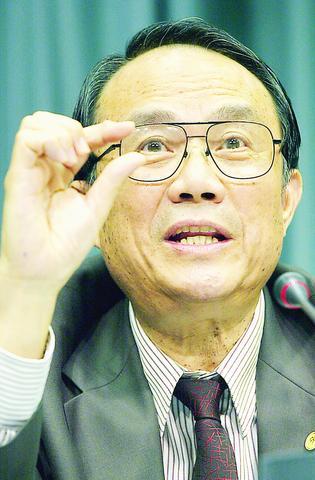Taiwan began its 11th bid to join the UN as 15 of its diplomatic allies submitted a joint proposal to the body in support of the nation's entry, the Ministry of Foreign Affairs said yesterday.
"It's our hope that countries lacking diplomatic ties with Taiwan will speak for us on the floor of the UN General Assembly," Vice Minister of Foreign Affairs Michael Kau (
The proposal said Taiwan's exclusion from the UN is a moral and legal challenge for the international community.

PHOTO: GEORGE TSORNG, TAIPEI TIMESN
The proposal also asked the UN General Assembly to include a supplementary item entitled "Question of the Representation of the Republic of China (Taiwan) in the United Nations" on the agenda of its 58th session, slated to begin on Sept. 16.
The 15 countries are Belize, Burkina Faso, Chad, the Commonwealth of Dominica, the Dominican Republic, El Salvador, Gambia, Grenada, Malawi, Nicaragua, Palau, Sao Tome and Principe, Solomon Islands, Swaziland and Tuvalu.
"The Taiwan Presbyterian Church and local Aboriginal groups are slated to dispatch a large mission to New York City to get our views across," Kau said.
Although Taiwan has been frustrated by its inability to return to the UN fold since it was expelled in 1971, continuing to bid for access to the UN is essential since it can highlight the country's yearnings for a return to the body, he said.
"It is unjust that the 23 million people of Taiwan are not represented at the UN. We have to make this known to the international community," Kau said.
When asked why the country didn't use "Taiwan" in its UN bid instead of "Republic of China (Taiwan)," Kau said the ROC remains the nation's formal designation according to the Constitution, adding that the word Taiwan in parentheses could help clarify the difference between the ROC and the People's Republic of China (PRC).
A memorandum attached to the proposal said Taiwan is a free and peace-loving state, and that its democratically elected government is the only legitimate body able to represent the interests and wishes of the people of Taiwan at the UN.
It also argued that UN General Assembly Resolution 2758, adopted on Oct. 25, 1971, which seated Beijing at the UN, did not resolve the issue of Taiwan's representation.
Kau said the resolution has been misinterpreted to justify Taiwan's exclusion.
The resolution recognized the PRC government as the only legitimate representative of China to the UN and "to expel forthwith the representatives of Chiang Kai-shek (
"The resolution expelled the representatives of Chiang Kai-shek, but the [current] government in Taiwan is not equal to the Chiang Kai-shek regime. This resolution is not applicable to contemporary Taiwan," said Kau, a former political scientist at Brown University in the US.
Kau also said the government has no plan to hold a referendum on the nation's UN bid.

AGING: As of last month, people aged 65 or older accounted for 20.06 percent of the total population and the number of couples who got married fell by 18,685 from 2024 Taiwan has surpassed South Korea as the country least willing to have children, with an annual crude birthrate of 4.62 per 1,000 people, Ministry of the Interior data showed yesterday. The nation was previously ranked the second-lowest country in terms of total fertility rate, or the average number of children a woman has in her lifetime. However, South Korea’s fertility rate began to recover from 2023, with total fertility rate rising from 0.72 and estimated to reach 0.82 to 0.85 by last year, and the crude birthrate projected at 6.7 per 1,000 people. Japan’s crude birthrate was projected to fall below six,

US President Donald Trump in an interview with the New York Times published on Thursday said that “it’s up to” Chinese President Xi Jinping (習近平) what China does on Taiwan, but that he would be “very unhappy” with a change in the “status quo.” “He [Xi] considers it to be a part of China, and that’s up to him what he’s going to be doing, but I’ve expressed to him that I would be very unhappy if he did that, and I don’t think he’ll do that. I hope he doesn’t do that,” Trump said. Trump made the comments in the context

SELF-DEFENSE: Tokyo has accelerated its spending goal and its defense minister said the nation needs to discuss whether it should develop nuclear-powered submarines China is ramping up objections to what it sees as Japan’s desire to acquire nuclear weapons, despite Tokyo’s longstanding renunciation of such arms, deepening another fissure in the two neighbors’ increasingly tense ties. In what appears to be a concerted effort, China’s foreign and defense ministries issued statements on Thursday condemning alleged remilitarism efforts by Tokyo. The remarks came as two of the country’s top think tanks jointly issued a 29-page report framing actions by “right-wing forces” in Japan as posing a “serious threat” to world peace. While that report did not define “right-wing forces,” the Chinese Ministry of Foreign Affairs was

PREPAREDNESS: Given the difficulty of importing ammunition during wartime, the Ministry of National Defense said it would prioritize ‘coproduction’ partnerships A newly formed unit of the Marine Corps tasked with land-based security operations has recently replaced its aging, domestically produced rifles with more advanced, US-made M4A1 rifles, a source said yesterday. The unnamed source familiar with the matter said the First Security Battalion of the Marine Corps’ Air Defense and Base Guard Group has replaced its older T65K2 rifles, which have been in service since the late 1980s, with the newly received M4A1s. The source did not say exactly when the upgrade took place or how many M4A1s were issued to the battalion. The confirmation came after Chinese-language media reported